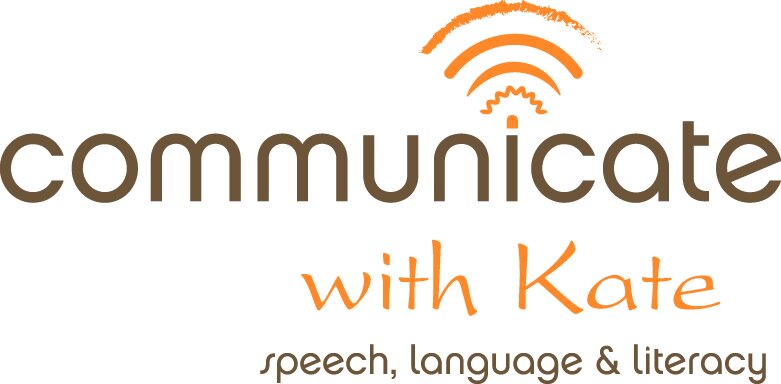Why Social Groups Can Open Doors For Kids. . .
Part 2 of Blog Series on Play
For information on Kate’s social language groups, click HERE.
Hello! I started a new blog series on 'play’ last month with my first blog focused on the HUGE importance of play in our children’s lives. As I mentioned, ‘play is a child’s work’ and I truly believe it. It’s in these moments of peer interaction where children have countless opportunities to practice so many things they need to be competent social thinkers and communicators. As I also mentioned in the previous blog, this ‘play’ we speak of can be incredibly challenging and frustrating for children of all ages who struggle in the area of social communication. So today I want to talk about how social language groups can provide the needed supports to help these children grow and learn from their play and social interactions.
Children with ‘typical’ social/pragmatic skills tend to learn and almost ‘absorb’ life’s complex social dynamics quite independently. The frequent opportunities these children have to play/interact with peers (because play and social interaction come relatively ‘easy’ to them), allow them to easily pop in and out of social environments and practice such skills as negotiation, problem solving, self-regulation, perspective taking and language skills with very little adult intervention. These children simply have more experiences and opportunities to practice, so their social/language skills steadily increase and improve with little adult support needed.
So who are social language groups for?
Children who are challenged in the area of social communication do NOT simply ‘absorb’ these skills. For these children, appropriate adult and peer supports have to be in place in order for them to grow and thrive in this area. These children do not easily initiate or join into play and once in social interactions, often struggle to stay in these interactions for long. So they’re at a disadvantage right out of the gate if they engage LESS in social interactions and, therefore, have far fewer opportunities to practice these social skills! It can be a difficult cycle of ‘strike outs’ for these kiddos, where they’re seeing very few successes and taking many hits to their confidence. So who are these kids? They could be children with many different diagnoses like high-functioning autism/aspergers, ADHD, anxiety, nonverbal learning disability, social communication disorder or may have no diagnosis at all but simply struggle to really ‘connect’ with others. If you know a child like this, a social language group could provide invaluable support and practice opportunities to help build those social competencies.
These children also struggle to know what to do once they ARE engaged with peers. They may lack skills of observation to pick up on what peers are doing or saying. They may struggle to accurately interpret what they’re seeing or hearing (i.e. not able to ‘read’ the comments, facial expressions or body language of their peers). They may struggle to think about their peers and be stuck strictly on their own thoughts/agenda. For these kids, we must EXPLICITLY TEACH these complicated social rules and ways of thinking and we must provide OPPORTUNITIES TO PRACTICE in a safe, structured, supportive environment. What better way to learn and practice these skills than in a small group of peers who are challenged in the same area, with a supportive adult walking them through this complex world? This is where social language groups are hugely beneficial!
Play for 6 year olds may look like acting out a trip to the zoo or building a massive lego city with peers. Play for a 13 year old may look like hanging out at a park with friends or discussing the new video game they bought for their XBox. No matter the age or stage of the child, play is ‘social’ and involves being actively engaged in an enjoyable activity with others. Social groups should build around these developmental stages, incorporate kids’ interests and provide appropriate structure and supports to help kids learn, grow and experience success in a social setting. Again, it’s all about explicit teaching of these complex social rules and a safe environment to practice with peers.
There are a number of great methodologies and treatments out there (with growing research behind them) showing the effectiveness of social communication interventions with different populations. As speech pathologists, we are trained in the area of social/pragmatic language and many of us work in this area extensively so we do have knowledge and experience with many evidence-based approaches. If you’re interested in digging into some research that looks at effectiveness, take a look at this study that analyzed both the Social Thinking and TEACCH methodologies. The big take away is that many social communication interventions really do help our kids and there’s no ONE intervention that’s the magic pill. It’s a journey for these kids, for many possibly a lifelong journey. Social groups (and our role as facilitators) allow us to slowly and intentionally crack open and breakdown a social world that is often confusing, overwhelming and scary for them. Change may not be immediate but it happens with time, patience, support and hopefully a lot of laughter along the way!
If your child or someone you know would benefit from social language groups and you’re in the Ann Arbor/Washtenaw area, please take a look at Social Language Groups under the ‘Services’ portion of my website or click HERE for more information. I outline what my social groups look like and hopefully answer all of those Frequently Asked Questions!

